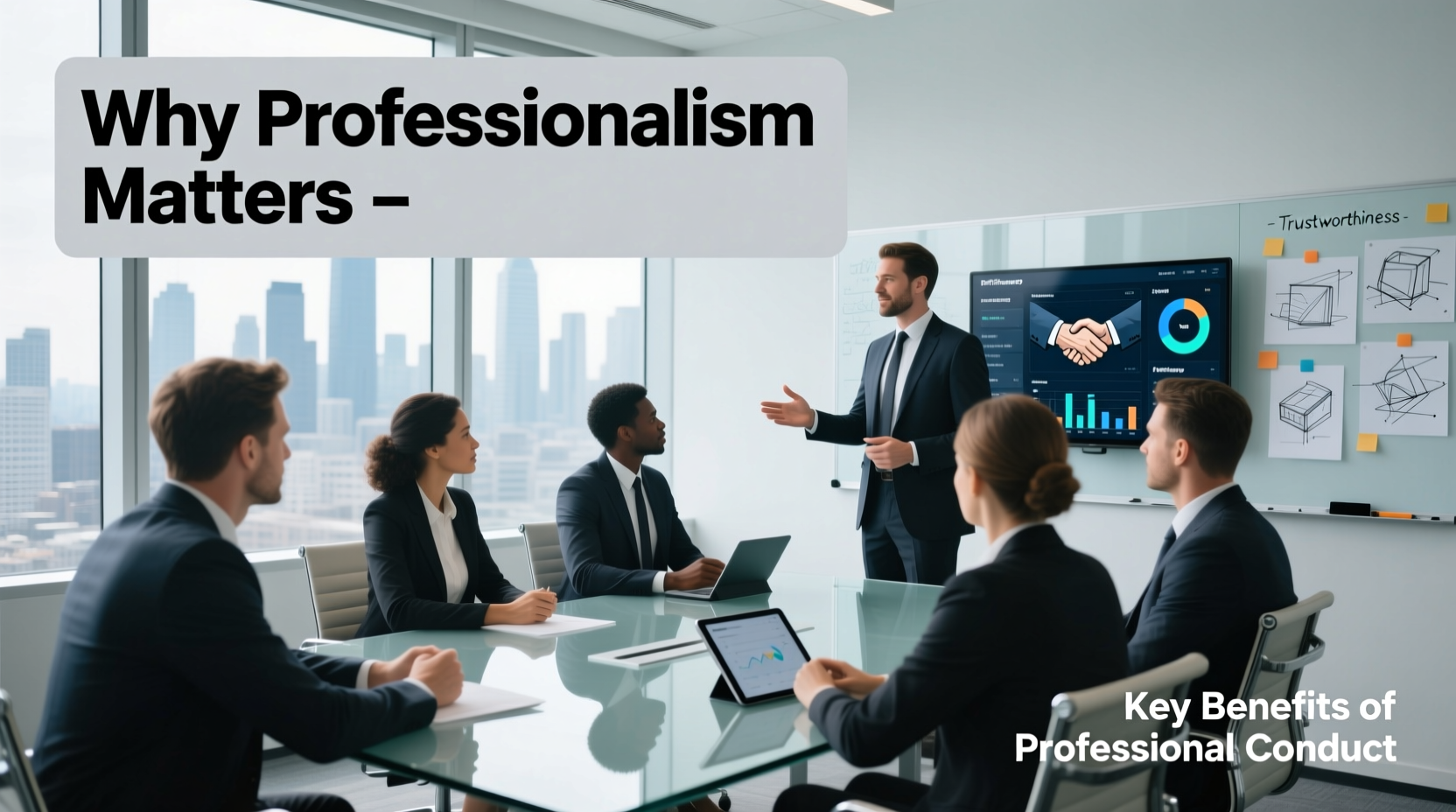Professionalism is more than just wearing a suit or showing up on time. It’s a combination of behavior, communication, work ethic, and attitude that shapes how others perceive you in the workplace. In an era where soft skills are increasingly valued alongside technical expertise, maintaining a high standard of professionalism can set you apart from peers, open doors to advancement, and foster lasting relationships across industries.
Whether you're early in your career or leading a team, professionalism influences outcomes far beyond first impressions. It builds credibility, strengthens collaboration, and contributes to organizational culture. More importantly, it creates a personal brand rooted in reliability and respect—qualities that employers, clients, and colleagues actively seek.
The Foundation of Workplace Trust

Trust is the cornerstone of every successful working relationship. When individuals act professionally, they signal consistency, integrity, and accountability. These traits reduce uncertainty and encourage others to rely on them for tasks, decisions, and leadership.
For example, meeting deadlines, honoring commitments, and communicating transparently all reinforce trust. A professional demeanor ensures that even under pressure, your actions remain predictable and respectful. This predictability fosters psychological safety within teams, allowing innovation and honest dialogue to thrive.
“Trust grows not from grand gestures but from consistent, professional behavior over time.” — Dr. Linda Chen, Organizational Psychologist
Enhanced Career Opportunities and Advancement
Professionals are often first in line for promotions, special projects, and leadership roles. Decision-makers tend to promote those who demonstrate emotional intelligence, punctuality, and a solutions-oriented mindset—hallmarks of professionalism.
Consider two employees with equal technical skills: one frequently arrives late, sends unpolished emails, and reacts defensively to feedback; the other is consistently prepared, communicates clearly, and accepts constructive criticism gracefully. Who would you choose for a client-facing role or managerial position?
Organizations invest in people they believe represent their values well. Professional conduct signals that you’re ready to uphold company standards externally and internally, making you a safer bet for growth opportunities.
Real-World Example: The Promotion That Hinged on Demeanor
Jamal worked as a mid-level analyst at a financial services firm. While several team members had stronger technical modeling skills, Jamal stood out during quarterly reviews because he always submitted reports ahead of schedule, dressed appropriately for client meetings, and responded to emails within four hours—even on weekends when urgent issues arose.
When a senior associate role opened up, his manager cited not only competence but also “dependable professionalism” as the deciding factor. His ability to maintain composure during high-pressure audits and represent the firm confidently contributed directly to his promotion.
Improved Communication and Collaboration
Effective teamwork depends on clear, respectful communication. Professionalism ensures that tone, language, and timing align with workplace norms, reducing misunderstandings and friction.
This includes active listening, avoiding gossip, using inclusive language, and delivering feedback constructively. In remote or hybrid environments, where nonverbal cues are limited, written professionalism—such as structured emails and timely responses—becomes even more critical.
| Aspect | Professional Approach | Unprofessional Behavior |
|---|---|---|
| Email Etiquette | Clear subject lines, proper salutations, concise content | Vague subjects, abrupt messages, excessive emojis |
| Feedback Delivery | Private, specific, solution-focused | Critical in public, vague complaints, blame-oriented |
| Meeting Conduct | Punctual, prepared, respectful of speaking turns | Late arrival, multitasking, interrupting |
Resilience During Conflict and Change
No workplace is immune to conflict or disruption. How individuals respond reveals much about their level of professionalism. Staying calm under stress, managing disagreements respectfully, and adapting to change without resistance are signs of emotional maturity and self-control.
During organizational restructuring, for instance, professionals focus on solutions rather than rumors. They support colleagues, maintain productivity, and keep communication channels open. Their stability provides anchor points for teams navigating uncertainty.
Conversely, unprofessional reactions—such as public complaints, passive-aggressive remarks, or withdrawal—can damage reputations and isolate individuals from future opportunities.
Actionable Checklist: Maintaining Professionalism Under Pressure
- Pause before responding to emotionally charged situations
- Seek clarification instead of making assumptions
- Document key discussions and agreements
- Use neutral language in written and verbal communication
- Focus on shared goals, not personal grievances
Long-Term Reputation and Personal Branding
Your reputation precedes you—especially in interconnected industries. Professionals build a personal brand defined by reliability, ethics, and excellence. Once established, this reputation becomes an asset that travels with you across jobs, networks, and sectors.
In contrast, a single incident of unprofessional behavior—like sending a heated email or failing to honor confidentiality—can spread quickly and linger for years. LinkedIn endorsements, referrals, and recommendations are often based on perceived professionalism as much as skill.
Building a strong personal brand doesn’t require perfection, but consistency. It means showing up with purpose, treating everyone with respect regardless of rank, and continuously seeking improvement.
Frequently Asked Questions
Does professionalism mean being formal all the time?
No. Professionalism is about appropriateness, not rigidity. In a creative startup, professionalism might include casual dress but still demands respect, timeliness, and accountability. The core principles adapt to context while preserving integrity and reliability.
Can someone become more professional over time?
Absolutely. Professionalism is a learned skill. Through self-awareness, mentorship, and practice, anyone can improve their communication, emotional regulation, and work habits. Many organizations offer training programs specifically designed to develop these competencies.
Is professionalism important in remote work settings?
Yes, arguably more so. Without face-to-face interaction, digital behavior—response times, video call etiquette, clarity of messaging—becomes the primary indicator of professionalism. Remote workers must be proactive in staying visible, accountable, and engaged.
Conclusion: Make Professionalism a Daily Practice
Being professional isn’t a one-time achievement—it’s a continuous commitment to excellence in action and attitude. The benefits extend beyond job security and promotions. They include deeper trust, broader influence, and the quiet confidence that comes from knowing you conduct yourself with integrity.
Every email sent, meeting attended, and challenge faced is an opportunity to reinforce your professional identity. Start small: refine your communication style, honor your commitments, and treat every interaction as part of your long-term legacy.









 浙公网安备
33010002000092号
浙公网安备
33010002000092号 浙B2-20120091-4
浙B2-20120091-4
Comments
No comments yet. Why don't you start the discussion?